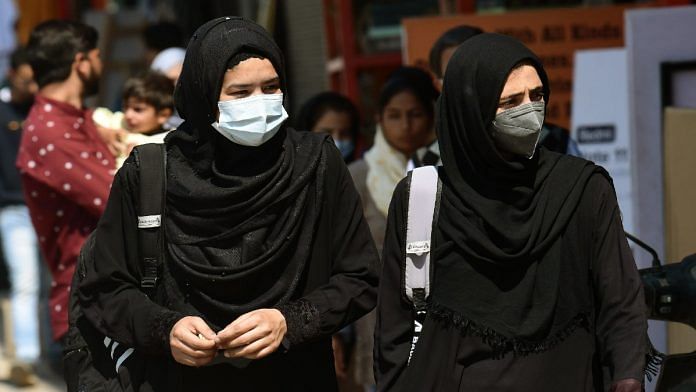New Delhi: The Karnataka government’s order, which virtually banned the use of hijab, would strike a death knell for female Muslim students who would be “forced to opt out of secular education institutions to go back to madrasas”, petitioners in the hijab ban case told the Supreme Court Wednesday.
Senior advocate Huzefa Ahmadi advanced submissions on behalf of one of the petitioners and said Muslim girls who were attending pre-university colleges were able to break stereotypes, albeit wearing hijabs.
Ahmadi claimed that the March judgment of Karnataka HC, upholding the hijab ban, has led to discrimination of Muslim students, who have been forced to drop out of school. He further claimed that around 17,000 students did not write their exams following the order because they were not allowed in school with hijabs.
“The priority of the state should be to encourage more and more students to come out and seek education. These are girl students who have broken barriers. But the government order would force them to go back to theological institutions, which is not in sync with our constitution,” the senior counsel said.
He read out testimonials of students from an 8 September report prepared by human rights body, the People’s Union for Civil Liberties (PUCL), on the impact of the HC judgment.
Submitting before a bench of justices Hemant Gupta and Sudhanshu Dhulia, Ahmadi contended that students who were attending school in hijabs came from conservative families and had been wearing the headscarf for a long time.
“The suddenness of the decision came as a shock to them and disoriented them. Today, if you take away what they consider as an essential religious practice, what will be the effect. They will be forced to go back to madrasas,” Ahmadi said, relying on the PUCL report.
Also Read: ‘Indian courts not equipped to judge Quran’: Petitioners slam Karnataka HC’s hijab ban in SC
‘Argument on Muslim girls’ education never raised before HC’
However, the bench — which is hearing a batch of appeals against the Karnataka HC judgment — told Ahmadi that the argument on the point that Muslim girls from conservative background were a deprived lot, when it came to education, was never raised before the HC.
“The only point you raised was that hijab wearing is an essential religious practice and that is what the HC has ruled on. Whether drop-out rate amongst Muslim girl students is high or not is a factual question. This should have been placed before the HC,” the judges told Ahmadi.
They noted that they “don’t know how authentic it is”, referring to the report, as it was produced within months of the HC judgment. “We could have considered it if it came a year or two after the verdict,” the judges said.
Ahmadi, however, asserted that the immediate effect of the judgment “can be felt on the ground”.
“Take it from a purely commonsensical point of view. These students are from conservative families,” the counsel added.
When the court asked him if Muslim girls were being forced to wear hijab for attending secular institutions, he said that parents might say “don’t go to school, go to madrasa”.
Earlier, opening his arguments, Ahmadi contended that the government order was contrary to the concept of fraternity in the preamble of the Constitution.
“The Indian Constitution promises equality, liberty and fraternity. While liberty and equality are qualified, fraternity is absolute,” he said.
“The government order confuses fraternity with uniformity and mandates that students should transcend their group identity and follow standardised practices. This (hijab ban) is against this (apex court) ruling that disapproves homogeneity,” the lawyer added.
With the petitioners’ side still to conclude their arguments, the court will continue with the hearing Thursday.
(Edited by Theres Sudeep)
Also Read: Hijab, Rampuri dialect, Muslim irony—Instagram’s Bajis are flexing identity, shifting gaze



